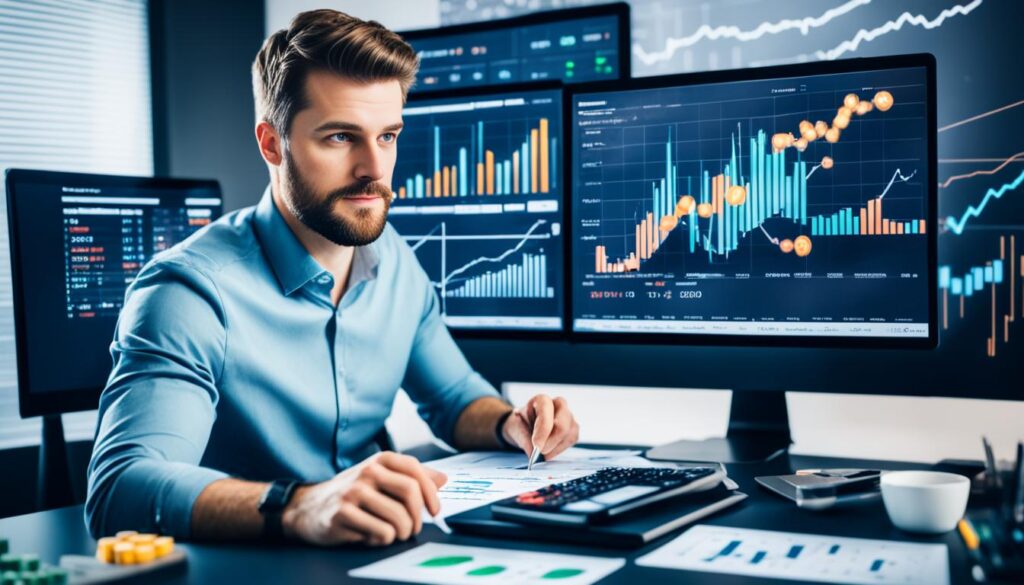Best Crypto Accounting Tool for Tax Compliance
Have you ever found yourself overwhelmed by the complexities of cryptocurrency taxes? I certainly have. As a crypto enthusiast, I’ve experienced the frustrations of trying to stay compliant with ever-changing regulations and accurately report my digital asset transactions. It can be a daunting task that takes valuable time away from enjoying the benefits of this exciting new financial landscape.
This is why finding the best crypto accounting tool for tax compliance is crucial. The right software can simplify the process, save you time, and ensure that you meet your tax obligations without any unnecessary stress. Whether you’re an individual crypto user or a business, having the right accounting software can make your life so much easier.
In this article, I will guide you through the top crypto accounting tools available in the market that can streamline your tax compliance and help you manage your digital assets efficiently. So let’s dive in and take a look at the best solutions for your crypto accounting needs.
Key Takeaways:
- Effective crypto accounting tools simplify the process of managing and reporting digital assets for tax compliance.
- Cryptocurrencies are subject to tax regulations in many countries, and it’s crucial to accurately report crypto transactions.
- Various types of crypto transactions, such as selling, exchanging, staking, and mining, are subject to taxation.
- The benefits of using crypto accounting tools include automatic data import, accurate tax calculations, and integration with tax professionals.
- When choosing a crypto accounting tool, consider features like transaction import, currency support, tax form support, and data visualization.
Understanding Crypto Tax Regulations
To effectively navigate the world of cryptocurrencies and ensure compliance with tax regulations, it is essential to have a clear understanding of the rules and guidelines surrounding crypto taxation. Various countries, including the United States, the UK, Japan, Canada, Australia, and many European nations, have established tax regulations for cryptocurrencies. These regulations typically classify cryptocurrencies as property, commodities, or miscellaneous income, making them subject to taxation.
As an investor or cryptocurrency user, it is crucial to stay informed about the tax regulations applicable in your jurisdiction and accurately report your crypto transactions for tax purposes. Proper cryptocurrency bookkeeping and digital asset management are essential to maintain accurate records and meet your tax obligations.
By leveraging crypto tax software, you can simplify and automate the process of managing your crypto transactions for tax purposes. These software solutions help you track your digital assets, calculate capital gains and losses, and generate comprehensive tax reports. Additionally, they ensure that you can accurately categorize different types of crypto transactions and comply with the required tax forms.
Key Crypto Tax Regulations
“Cryptocurrency tax regulations classify cryptocurrencies as property, commodities, or miscellaneous income, making them subject to taxation.”
Here are some key aspects of crypto tax regulations that you should be aware of:
- Cryptocurrencies are considered taxable assets: In most cases, cryptocurrencies are treated as taxable assets, similar to stocks or real estate. This means that any gains or losses from crypto transactions are subject to taxation.
- Capital gains tax applies to crypto transactions: When you sell your cryptocurrencies for fiat currency or another cryptocurrency, you may be liable for capital gains tax on any profit you make. The tax rate may vary based on your jurisdiction and the duration you held the crypto assets.
- Reporting crypto income is essential: If you receive cryptocurrency as payment for goods or services, it is essential to report it as income. This applies to freelancers, contractors, or businesses that accept crypto payments.
- Airdrops and forks may be taxable: If you receive free tokens through airdrops or as a result of blockchain forks, they may be subject to taxation. The fair market value of the received tokens is typically considered taxable income.
- International tax reporting obligations: If you engage in cross-border crypto transactions, it is crucial to understand the tax reporting obligations in both your home country and the country where the transaction occurs.
Importance of Crypto Tax Software for Compliance
The complex nature of crypto tax regulations, coupled with the volatile and rapidly evolving cryptocurrency market, makes manual tax calculations and reporting a tedious and error-prone task. This is where crypto tax software comes in. It simplifies the process, providing you with the necessary tools and features to comply with tax regulations more efficiently.
With crypto tax software, you can automate the calculation of capital gains and losses, easily import transaction data from your exchanges and wallets, and generate accurate tax reports tailored to your jurisdiction. These software solutions help streamline your cryptocurrency bookkeeping, digital asset management, and overall tax compliance, saving you time and effort.
Additionally, some advanced crypto tax software offers features such as integration with tax professionals or crypto tax optimization, enabling you to maximize your deductions and minimize your tax liabilities.
By leveraging the benefits of crypto tax software, you can gain peace of mind knowing that your crypto transactions are being accurately reported for tax purposes. It’s an essential tool for any individual or business involved in the cryptocurrency space.
Types of Crypto Transactions Subject to Taxation
Various types of crypto transactions are subject to taxation in many countries. It’s important to have a clear understanding of these transactions and accurately report them for tax purposes. Here are some common crypto activities that may be taxable:
- Selling cryptocurrencies for fiat at a profit or loss
- Exchanging digital assets on a decentralized exchange or centralized exchange
- Receiving airdrops
- Selling Non-Fungible Tokens (NFTs)
- Earning income from blockchain and play-to-earn games
- Staking income
- Providing liquidity or yield farming
- Using CeFi lending platforms or DeFi lending protocols
- Crypto mining
- Using crypto debit cards
- Earning rental or advertisement income from digital land or renting NFTs
- Providing services and getting paid in cryptocurrency
These activities can have different tax implications depending on the jurisdiction and specific regulations. It’s crucial to keep track of your transactions and consult with cryptocurrency accounting services to ensure compliance with virtual currency accounting rules.
Understanding the tax treatment of each type of transaction and accurately reporting them will help you avoid potential penalties and ensure compliance with tax authorities.
| Transaction Type | Tax Implications |
|---|---|
| Selling cryptocurrencies for fiat | Capital gains or losses |
| Exchanging digital assets | Capital gains or losses |
| Receiving airdrops | Income tax on the fair market value |
| Selling NFTs | Capital gains or losses |
| Earning income from blockchain and play-to-earn games | Income tax on the fair market value |
| Staking income | Income tax on the earnings |
| Providing liquidity or yield farming | Income tax on the earnings |
| Using lending platforms | Income tax on the earnings |
| Crypto mining | Income tax on the earnings |
| Using crypto debit cards | Capital gains or losses |
| Earning rental or advertisement income from digital land or renting NFTs | Income tax on the earnings |
| Providing services and getting paid in crypto | Income tax on the fair market value |
Accurate tracking of these transactions and consulting with cryptocurrency accounting services can help ensure proper crypto ledger management and compliance with virtual currency accounting requirements.
Benefits of Using Crypto Accounting Tools
Using crypto accounting tools can provide several benefits in managing your crypto transactions and taxes. These tools automate various processes and offer features that simplify the complex nature of crypto tax compliance. Let’s explore some of the key benefits:
1. Streamlined Data Import
Crypto accounting tools allow you to automatically import data from your crypto exchanges, wallets, and decentralized finance (DeFi) platforms. This eliminates the need for manual data entry and ensures that all your transactions are accurately recorded.
2. Accurate Gain and Loss Calculation
By utilizing crypto accounting tools, you can automatically calculate your gains and losses from crypto trading activities. The tools consider factors such as purchase price, sale price, and fees, providing accurate and reliable calculations for tax reporting purposes.
3. Portfolio Tracking
Crypto accounting tools offer portfolio tracking features that give you a comprehensive overview of your digital assets. You can monitor the performance of your investments, track your asset allocation, and gain valuable insights into your portfolio’s value.
4. Simplified Tax Reporting
With the help of crypto accounting tools, you can generate detailed tax reports that facilitate the preparation of your crypto tax filings. These reports categorize your transactions, calculate tax liabilities, and provide the necessary information to fill out the appropriate tax forms.
5. Integration with Tax Professionals
Some advanced crypto accounting tools offer integration with tax professionals or accounting firms that specialize in cryptocurrency tax services. This integration allows you to seek expert advice, ensure compliance with tax regulations, and optimize your tax strategies.
In the complex world of cryptocurrency taxation, using dedicated accounting tools can save you both time and effort. These tools automate essential processes, provide accurate calculations, simplify tax reporting, and offer professional support. Streamline your crypto tax management today with reliable accounting software.
| Benefits of Using Crypto Accounting Tools |
|---|
| Streamlined Data Import |
| Accurate Gain and Loss Calculation |
| Portfolio Tracking |
| Simplified Tax Reporting |
| Integration with Tax Professionals |
Top Features to Consider in a Crypto Accounting Tool
When it comes to choosing a crypto accounting tool, there are several key features that you should consider. These features will help you effectively manage your digital assets, optimize your crypto tax reporting, and ensure accurate tracking of your transactions. Here are the top features to look for:
1. Automatic Import of Transaction Data: A good crypto accounting tool should have the capability to automatically import transaction data from your exchanges and wallets. This saves you time and ensures that all your transactions are captured for accurate reporting.
2. Comprehensive Support for Major Cryptocurrencies and Blockchain Platforms: Make sure that the tool you choose supports a wide range of cryptocurrencies and blockchain platforms. This ensures that you can easily track and manage all your digital assets in one place.
3. Accurate Calculation of Capital Gains and Losses: The tool should be able to accurately calculate your capital gains and losses based on the specific tax regulations of your jurisdiction. This feature is essential for proper tax reporting and optimization.
4. Support for Various Tax Forms: Different countries have different tax forms for reporting crypto transactions. Look for a tool that supports the tax forms required in your jurisdiction to ensure compliance with local regulations.
5. Secure Storage of User Data: Data security is crucial when dealing with sensitive financial information. Choose a tool that prioritizes the security and privacy of your data to protect your assets and personal information.
6. Data Visualization and Reporting Tools: Visualizing your crypto portfolio and tax reports can help you gain insights and make informed decisions. Look for a tool that provides intuitive data visualization and reporting tools to effectively analyze your financial data.
7. Integration with Tax Professionals or Tax Software: Some crypto accounting tools offer integration with tax professionals or tax software, allowing you to collaborate seamlessly and get expert advice when needed. This feature can be valuable, especially if you have complex tax situations or need professional assistance.
Considering these top features will ensure that you choose a crypto accounting tool that meets your specific needs, simplifies your tax reporting process, and optimizes your crypto tax obligations.
| Feature | Importance |
|---|---|
| Automatic Import of Transaction Data | High |
| Comprehensive Support for Major Cryptocurrencies and Blockchain Platforms | High |
| Accurate Calculation of Capital Gains and Losses | High |
| Support for Various Tax Forms | High |
| Secure Storage of User Data | Medium |
| Data Visualization and Reporting Tools | Medium |
| Integration with Tax Professionals or Tax Software | Low |

Comparison of Top Crypto Accounting Tools
In this section, I will provide a comparison of the best crypto accounting tools available in the market. Choosing the right tool is essential for effectively managing your crypto transactions and ensuring tax compliance. When evaluating these tools, factors such as NFT support, DeFi support, portfolio tracking capabilities, and pricing should be taken into consideration.
Here are some of the most popular crypto accounting tools:
- Blockpit: Blockpit offers country-specific tax reports and pre-filled tax forms. It supports a wide range of crypto exchanges, wallets, and blockchains, and provides accurate tax calculations based on your jurisdiction. Blockpit also offers features like tax optimization and support for NFTs, DeFi protocols, staking, and mining.
- CoinTracker: CoinTracker is a comprehensive tool for tracking your crypto portfolio and generating tax reports. It allows for automatic import of transaction data from exchanges and wallets, making it easy to keep track of your assets. Although CoinTracker has limited NFT and DeFi support, it is a reliable option for managing and reporting your crypto transactions.
- TaxBit: TaxBit is an expert-assisted crypto tax solution that provides guidance from tax professionals. It supports various crypto exchanges and wallets, enabling easy import of transaction data. While TaxBit has limited support for NFTs and DeFi, it is an excellent choice if you prefer personalized assistance with your crypto tax obligations.
- Accointing: Accointing offers comprehensive crypto accounting features, including support for NFTs, DeFi, and portfolio tracking. It allows for automatic data import from exchanges and wallets, ensuring accurate tax calculations and easy reporting.
- TokenTax: TokenTax is a popular choice for crypto tax reporting. It supports a wide range of exchanges and wallets and provides features like DeFi support, tax optimization, and the ability to import large transaction volumes.
- Koinly: Koinly is a user-friendly tool that supports multiple exchanges and blockchains. It offers a range of features, including portfolio tracking, tax reporting, and support for DeFi transactions.
- ZenLedger: ZenLedger is designed to simplify crypto tax reporting. It supports various exchanges, wallets, and DeFi platforms, automating the process of importing transaction data and generating accurate tax reports.
- CryptoTaxCalculator: CryptoTaxCalculator offers a user-friendly interface and supports a wide range of exchanges and wallets. It provides features like portfolio tracking, tax reporting, and the ability to generate tailored tax reports based on your jurisdiction.
- Coinpanda: Coinpanda is a comprehensive crypto tax platform that supports multiple exchanges and integrates with popular accounting software applications. It offers features like automatic import of transaction data, portfolio tracking, and tax optimization.
- Coinledger: Coinledger is a crypto accounting tool that focuses on simplicity and user-friendliness. It supports various exchanges and wallets, allowing for easy import of transaction data and generating accurate tax reports.
Each of these tools has its own strengths and weaknesses. It’s important to consider your specific needs and preferences when choosing the best crypto accounting tool for you. Compare the features, pricing, and customer reviews to make an informed decision.
Crypto Accounting Tools Comparison Table
| Tool | NFT Support | DeFi Support | Portfolio Tracking | Pricing |
|---|---|---|---|---|
| Blockpit | Yes | Yes | Yes | Varies |
| CoinTracker | Limited | Limited | Yes | Varies |
| TaxBit | Limited | Limited | No | Varies |
| Accointing | Yes | Yes | Yes | Varies |
| TokenTax | Yes | Yes | Yes | Varies |
| Koinly | Yes | Yes | Yes | Varies |
| ZenLedger | Yes | Yes | Yes | Varies |
| CryptoTaxCalculator | Yes | Yes | Yes | Varies |
| Coinpanda | Yes | Yes | Yes | Varies |
| Coinledger | No | No | Yes | Varies |
Crypto Accounting Tools Comparison Insights
Based on the comparison table above, it is clear that most of the top crypto accounting tools offer NFT and DeFi support, as well as portfolio tracking capabilities. The pricing of these tools varies based on the features and level of service provided. It is important to consider your specific requirements and budget when making a decision.
Keep in mind that this comparison table is a starting point for your evaluation process. It is advisable to visit the websites of each tool to gather more detailed information and compare their features, integrations, customer support, and user reviews to find the best crypto accounting tool that aligns with your needs and preferences.
Blockpit – All-in-One Crypto Tax Solution
When it comes to crypto tax solutions, Blockpit stands out as an all-in-one platform that provides comprehensive tools for tax compliance. With its country-specific tax reports and pre-filled tax forms, Blockpit ensures accurate and hassle-free tax filing for cryptocurrency users.
One of the standout features of Blockpit is its wide range of supported crypto exchanges, wallets, and blockchains. Whether you trade on popular exchanges like Binance, Coinbase, or Kraken, or hold your assets in wallets such as MetaMask or Ledger, Blockpit can seamlessly import transaction data. This saves you time and effort in manually tracking and entering your crypto activities.
Blockpit collaborates with KPMG, a renowned global professional services firm, to generate tax reports that are compliant with your specific jurisdiction. This partnership ensures accurate tax calculations, taking into account the latest tax regulations and guidelines. With Blockpit, you can have peace of mind knowing that your tax reports are reliable and in line with legal requirements.
Another noteworthy feature of Blockpit is its tax optimization functionality. This innovative tool helps you identify tax-saving opportunities, allowing you to maximize your deductions and minimize your tax liability. By leveraging this feature, you can optimize your crypto portfolio for tax purposes and potentially save a significant amount of money.
Blockpit also caters to the needs of individuals engaged in NFTs, DeFi protocols, staking, and mining. Its platform supports these activities, ensuring that you can accurately report and manage your crypto transactions in these areas.
Here is a visual representation of the features offered by Blockpit:
| Features | Description |
|---|---|
| Country-specific tax reports | Generate tax reports tailored to the tax regulations of your jurisdiction. |
| Pre-filled tax forms | Save time with pre-filled tax forms that streamline the tax filing process. |
| Wide range of supported exchanges, wallets, and blockchains | Import transaction data from popular crypto platforms. |
| Tax reports generated in cooperation with KPMG | Ensure accurate tax calculations aligned with legal requirements. |
| Tax optimization | Identify tax-saving opportunities and optimize your crypto portfolio for tax purposes. |
| Support for NFTs, DeFi protocols, staking, and mining | Accurately manage and report crypto transactions in these areas. |
CoinTracker – Comprehensive Crypto Portfolio Tracking and Tax Reporting
When it comes to managing your crypto transactions and ensuring tax compliance, CoinTracker is a comprehensive tool that offers both portfolio tracking and tax reporting functionalities. With its user-friendly interface and robust features, CoinTracker simplifies the process of monitoring your digital asset performance and calculating capital gains.
One of the key strengths of CoinTracker is its ability to automatically import transaction data from various exchanges and wallets, allowing you to effortlessly keep track of your crypto portfolio performance. By consolidating all your transaction data in one place, CoinTracker provides a comprehensive overview of your holdings, making it easier to analyze your gains and losses over time.
But CoinTracker goes beyond just tracking your portfolio. It also offers powerful tax reporting features that can help you accurately calculate capital gains and losses and generate tax forms. This functionality saves you time and effort, ensuring that you comply with tax regulations and report your crypto income correctly.
“CoinTracker simplifies the process of monitoring your digital asset performance and calculating capital gains.”
Although CoinTracker has limited support for NFTs and DeFi transactions, its core focus on portfolio tracking and tax reporting makes it an excellent choice for individuals and businesses looking for a reliable solution to manage and report their crypto transactions. CoinTracker’s intuitive design, coupled with its robust features, offers a seamless experience for users at all levels of expertise in the crypto industry.
Key Features of CoinTracker:
- Automatic import of transaction data from exchanges and wallets
- Comprehensive portfolio tracking for all major cryptocurrencies
- Accurate calculation of capital gains and losses
- Easy generation of tax forms for tax reporting
- User-friendly interface for intuitive navigation and data visualization
To give you a better idea of CoinTracker’s capabilities, here is a table comparing some of the key features of CoinTracker with other popular crypto accounting tools:
| Features | CoinTracker | Blockpit | TaxBit |
|---|---|---|---|
| Automatic Import of Transaction Data | ✅ | ✅ | ✅ |
| Portfolio Tracking | ✅ | ✅ | ✅ |
| Tax Reporting | ✅ | ✅ | ✅ |
| NFT Support | ❌ | ✅ | ❌ |
| DeFi Support | ❌ | ✅ | ❌ |
As you can see, CoinTracker offers a solid set of features for portfolio tracking and tax reporting. While it may have limited support for NFTs and DeFi transactions, its core functionality makes it a reliable choice for individuals and businesses who prioritize accurate portfolio tracking and tax compliance.
With CoinTracker, you can confidently manage your crypto transactions and accurately report your capital gains, ensuring peace of mind when it comes to your tax obligations.
![]()
TaxBit – Expert-Assisted Crypto Tax Solution
When it comes to managing your crypto taxes, having expert assistance can make all the difference. That’s where TaxBit comes in. As a leading crypto tax solution, TaxBit provides guidance and support from crypto tax experts who are well-versed in both the software and tax regulations.
One of the standout features of TaxBit is its commitment to fostering a supportive community. The platform offers helpful community tools where users can connect, ask questions, and share insights about crypto taxes. This collaborative environment ensures that you have access to a wealth of knowledge and can stay updated on the latest trends and strategies.
TaxBit stands out for its seamless integration with a wide range of crypto exchanges and wallets. With TaxBit, you can easily import your transaction data, saving you time and effort in manually entering each individual transaction. This efficient import process allows for accurate and comprehensive tax reporting while reducing the chances of errors.
While TaxBit may have limited support for NFTs and DeFi protocols, its core focus on personalized assistance sets it apart. The platform offers tailored solutions for individuals who prefer hands-on guidance with their crypto tax obligations. By working closely with tax professionals, TaxBit ensures that you receive personalized support based on your specific tax requirements.
Key Features of TaxBit:
- Expert assistance from crypto tax professionals
- Supportive community tools for knowledge sharing
- Seamless integration with various crypto exchanges and wallets
- Personalized guidance for your specific tax obligations
With TaxBit, you can have peace of mind knowing that you have a dedicated team of experts by your side, ensuring that your crypto tax compliance is accurate and up to date. Whether you are an individual crypto user or a business, TaxBit provides the expertise and support you need to navigate the complex world of crypto taxes.
Conclusion
Ensuring tax compliance and effectively managing your crypto transactions is essential in today’s digital landscape. By choosing the right crypto accounting tool, you can simplify the process and focus on growing your digital assets.
When selecting a crypto accounting tool, consider your specific needs and preferences. Look for features such as NFT support, DeFi capabilities, and portfolio tracking to align with your goals. Additionally, prioritize automatic import of transaction data, accurate tax calculations, secure data storage, and integration with tax professionals or software.
By streamlining your tax compliance with the best crypto tax solution, you can confidently navigate the complex world of crypto taxes. Stay compliant, stay organized, and manage your digital assets effectively for a successful crypto journey.
FAQ
What are the best crypto accounting tools for tax compliance?
Some of the best crypto accounting tools for tax compliance include Blockpit, CoinTracker, TaxBit, Accointing, TokenTax, Koinly, ZenLedger, CryptoTaxCalculator, Coinpanda, and Coinledger.
How do I ensure tax compliance in the crypto industry?
To ensure tax compliance in the crypto industry, it is important to accurately report your crypto transactions and stay informed about tax regulations in your jurisdiction.
What types of crypto transactions are subject to taxation?
Various types of crypto transactions subject to taxation include selling cryptocurrencies for fiat, exchanging digital assets, receiving airdrops, selling NFTs, earning income from blockchain games, staking, mining, providing services and getting paid in crypto, and more.
What benefits do crypto accounting tools offer for managing taxes?
Crypto accounting tools can simplify the process of managing taxes by automatically importing transaction data, calculating gains and losses, generating tax reports, categorizing transactions accurately, and providing features like tax optimization and integration with tax professionals.
What features should I consider when choosing a crypto accounting tool?
When choosing a crypto accounting tool, consider features such as automatic import of transaction data, comprehensive cryptocurrency support, accurate calculation of gains and losses, support for various tax forms, secure data storage, data visualization and reporting tools, and integration with tax professionals or tax software.

















It's great that you talked about how business insurance can provide financial protection against unexpected events and help ensure the…
I like that you mentioned how business insurance is essential for protecting your bottom line and the long-term viability of…